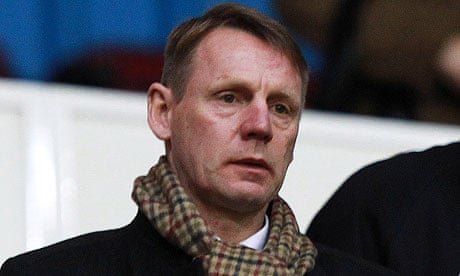Scene One: The late 1980s. Nottingham. It is a little after 8am, Stuart Pearce's mud-spattered Volvo estate, complete with straw bales in the back, swings into the City Ground car park. Having agreed to a rare interview he heads into the Nottingham Forest supporters' social club where a cleaner is telling the waiting reporter that Brian Clough's left-back is one of the "good guys".
Pearce talks about the love of horses instilled in him by his girlfriend, Liz, scathingly deconstructs the widespread convention that young footballers should marry at the earliest opportunity and marvels at the way his life has changed since the days when he worked as an electrician for Brent council, spent Friday nights at Wembley dog track and Saturday's playing for non-league Wealdstone.
Scene Two: The late 1990s, Newcastle. Pearce sits at a table in an Italian restaurant, drinking water and talking football with his then team-mate Warren Barton and their wives. Approaching retirement, the former England captain is at a stage in his career when many peers would shrug before quietly pocketing the money, but things are running less than smoothly at St James' Park and he is earnestly outlining a prescription for change. A study in almost evangelical intensity, he contradicts the view of professional footballers as cynical pragmatists who rarely care too deeply.
Scene Three: February 2012: Pearce, newly anointed as England's caretaker manager, crosses the border into Berkshire from his Wiltshire home to launch an after-school club for under-11s and present prizes to some technology-college pupils. The England Under-21 and Great Britain Olympic football coach is adept at body-swerving interview requests but when a young, local newspaper reporter politely requests a chat, Fabio Capello's temporary successor obliges. "It's a bit of a shock," he says. "But I'm immensely proud."
When it comes to categorising the qualities fans seek from an England coach, Pearce ticks an awful lot of boxes. Grounded, non-materialistic, unselfish, rarely precious, patriotic, passionate, hard-working, willing to challenge orthodoxies, scrupulously fair to referees, slightly unconventional and robustly no-nonsense, he could almost serve as an identikit of England's ideal manager.
Almost, but not quite. Tactical reservations aside, he can be far too intense for his own good and remains alarmingly highly strung. Sometimes the latter characteristic leads to moodiness and, rarely, rage.
In the course of countless games playing against and alongside him, Gary Lineker only recalls his England team-mate smiling "once", but treating management similarly seriously has, on occasion, proved to be counter-productive.
During the Under-21s' 2009 European Championship 4–0 defeat to Germany in the Malmo final, a frighteningly ferocious Pearce appeared poised to invade the pitch and thump Sebastian Boenisch after the full-back clattered into James Milner, before somehow pulling himself back from the brink of implosion.
A carefully constructed mask had slipped. Since retiring from playing at 40, Pearce, ever assiduous, has attended so many coaching and business-management courses that his sentences are often studded with corporate jargon. At times of stress, though, this measured, diligently acquired, facade can give way to "Psycho's" old default-setting – the in-your-face aggression which made him arguably the world's most intimidating left-back and once, infamously, resulted in him biting one of the nipples of Derby's Ted McMinn.
If, even then, such fury was usually controlled – as a professional Pearce was sent off only five times – these days he is more synonymous with the sort of strategic thinking which saw his Under-21 side qualify for the last three European tournaments.
Their record, in reaching a semi-final and that 2009 showpiece before exiting after the group stage in Denmark last year, is credible but Pearce's critics argue that when backed into a tactical corner his cautiousness takes over and he invariably resorts to long-ball tactics. Significantly, England attempted more unsuccessful long passes than any other team in Denmark.
In mitigation, Pearce retorts that he is a "pretty lightly raced" manager who, despite approaching his 50th birthday, has only taken charge of around 160 games having retired from playing considerably later than many of his contemporaries.
David James, who played for him during a rather underwhelming stint at Manchester City, endorses the point. "At City he was all roll up your sleeves and growl at people," the former England goalkeeper said. "Since then he's evolved into a seriously good international manager with a completely different style and approach."
No one doubts his work ethic. Last summer a diligent streak which has seen Pearce attend 14 games since becoming England caretaker, involved him travelling, voluntarily, to Colombia and serving as Brian Eastick's assistant during the Under-20s' World Cup. Eastick's England were eliminated by Nigeria in the first knockout round, with Pearce unconcerned about status in the back-seat role.
Some managers have to dominate every room they enter but as Pearce informed British troops in Afghanistan during a recent, reportedly hugely inspiring, speech at Camp Bastion, "being unselfish" is a trait shared by all great leaders.
As a former head girl at Ted Edgar's highly successful showjumping yard, Pearce's now wife, Liz, does not lack leadership qualities of her own. A talented horsewoman who early in their relationship had him happily mucking out loose boxes, she is no stereotypical WAG. While they regularly rehouse former racehorses at their Wiltshire stables, she is also credited with sparking an interest in the theatre and reading in a man who left school with five CSEs (grades D-E).
The father of Chelsea – at 12, already a star of her pony club – and eight year-old Harley, Pearce has become a country squire with a twist. Or at least one boasting a tattoo on an arm. "It's supposed to be an eagle set against the sun," said its owner, who acquired it in Stanmore as a "bored" teenager. "But it's been described as a porcupine having a period."
A dedicated punk devotee, the Stranglers remain a particular favourite, he is pictured on the inside sleeve of a Lurkers album, God's Lonely Men, but has not courted either fame or celebrity friends.
"Stuart was never obsessed with the media, money or cars," said Roy Keane, who played alongside him at Forest. Indeed after succeeding Kevin Keegan as manager at Manchester City, Pearce worked for months without the security of a contract, even debating whether he would deserve paying off should results founder.
Having grown up in north London, where his father variously worked unsociable shifts as a postman and a waiter at Quaglino's in Mayfair, he qualified as an electrician on leaving school. After finally being offered a professional contract by Coventry, Pearce kept his hand in, initially earning more from rewiring houses than playing football.
If such industry amused his team-mates they were amazed that, while with Wealdstone, he had secretly continued playing for his pub's Sunday side, Dynamo Kingsbury Kiev, having registered as Yak Jensen, supposedly a Russian goalkeeper.
In reality, Pearce is almost absurdly proud to be English. Unswervingly patriotic, he has flown a St George's cross from a flagpole in his garden and could surely work wonders for the UK tourist board. "I've travelled the world," he said. "And it's made me appreciate what we've got: London, the Cotswolds, tradition, the FA Cup."
Having reiterated, emphatically, that he does not share the politics of his BNP-supporting older brother, Dennis, he was dismayed at the recent recounting of a near two decade-old incident which saw him apologise to Paul Ince for a racist remark made during their playing days.
Paul Parker, then, like Ince, a Manchester United player, has defended Pearce. "The comments would have come out of ignorance not bigotry," said Parker. "I recall an incident playing for England when one of the opposition said something racist to Des Walker. The first person to stand up for Des was Stuart. He let this guy know exactly what he thought of him."
If Pearce has always been ultra loyal, he is also quick on the uptake. "I've had my moments but I've learnt from them," he said, referring to a youthful arrest for scaling traffic lights in Wembley. "I've been up a traffic light, but only once."
Should those signals be held on green as police out-riders whisk England's team bus towards Wembley Stadium on Wednesday, the caretaker manager will doubtless permit himself a private smile.

